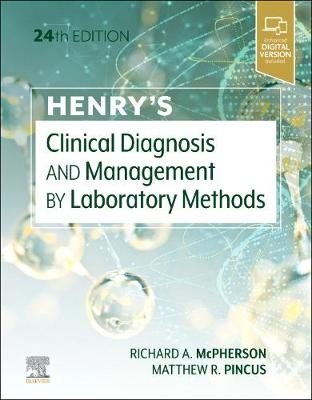
Henry's Clinical Diagnosis and Management by Laboratory Methods
Elsevier - Health Sciences Division (Verlag)
978-0-323-67320-4 (ISBN)
Remains the most comprehensive and authoritative text on every aspect of the clinical laboratory and the scientific foundation and clinical application of today's complete range of laboratory tests.
Updates include current hot topics and advances in clinical laboratory practices, including new and extended applications to diagnosis and management. New content covers next generation mass spectroscopy (MS), coagulation testing, next generation sequencing (NGS), transfusion medicine, genetics and cell-free DNA, therapeutic antibodies targeted to tumors, and new regulations such as ICD-10 coding for billing and reimbursement.
Emphasizes the clinical interpretation of laboratory data to assist the clinician in patient management.
Organizes chapters by organ system for quick access, and highlights information with full-color illustrations, tables, and diagrams.
Provides guidance on error detection, correction, and prevention, as well as cost-effective test selection.
Includes a chapter on Toxicology and Therapeutic Drug Monitoring that discusses the necessity of testing for therapeutic drugs that are more frequently being abused by users.
Enhanced eBook version included with purchase. Your enhanced eBook allows you to access all of the text, figures, and references from the book on a variety of devices.
Part 1: The Clinical Laboratory
1. General Concepts and Administrative Issues
2. Optimizing Laboratory Workflow and Performance
3. Preanalysis
4. Analysis: Principles of Instrumentation
5. Mass Spectrometry and Applications
6. Analysis: Clinical Laboratory Automation
7. Point-of-Care Testing and Physician Office Laboratories
8. Postanalysis: Medical Decision Making
9. Interpreting Laboratory Results
10. Laboratory Statistics
11. Quality Control
12. Clinical Laboratory Informatics
13. Financial Management
14. Ethics in Laboratory Medicine
Part 2: Clinical Chemistry
15. Evaluation of Renal Function, Water , Electrolytes and Acid-Base Function
16. Biochemical Markers of Bone Metabolism
17. Carbohydrates
18. Lipids and Dyslipoproteinemia
19. Cardiac Injury, Atherosclerosis, and Thrombotic Disease
20. Specific Proteins
21. Clinical Enzymology
22. Evaluation of Liver Function
23. Laboratory Diagnosis of Gastrointestinal and Pancreatic Disorders
24. Toxicology and Therapeutic Drug Monitoring
25. Evaluation of Endocrine Function
26. Reproductive Function and Pregnancy
27. Vitamins and Trace Elements
28. Chemical Basis for Analyte Assays and Common Interferences
Part 3: Urine and Other Body Fluids
29. Basic Examination of Urine
30. Cerebrospinal, Synovial, Serous Body Fluids, and Alternative Specimens
Part 4: Hematology and Transfusion Medicine
31. Basic Examination of Blood and Bone Marrow
32. Hematopoiesis
33. Erythrocytic Disorders
34. Leukocytic Disorders
35. The Flow Cytometric Evaluation for Hematopoietic Neoplasia
36. Immunohematology
37. Transfusion Medicine
38. Hemapheresis
39. Tissue Banking and Progenitor Cells
Part 5: Hemostasis and Thrombosis
40. Coagulation and Fibrinolysis
41. Platelet Disorders and Von Willebrand Disease
42. Laboratory Approach to Thrombotic Risk
43. Antithrombotic Therapy
Part 6: Immunology and Immunopathology
44. Overview of the Immune System and Immunologic Disorders
45. Immunoassays and Immunochemistry
46. Laboratory Evaluation of the Cellular Immune System
47. Laboratory Evaluation of Immunoglobulin Function and Humoral Immunity
48. Mediators of Inflammation: Complement
49. Mediators of Inflammation: Cytokines and Adhesion Molecules
50. Human Leukocyte Antigen: The Major Histocompatibility Complex of Man
51. The Major Histocompatibility Complex and Disease
52. Immunodeficiency Disorders
53. Clinical and Laboratory Evaluation of Systemic Autoimmune Rheumatic Diseases
54. Vasculitis
55. Organ-Specific Autoimmune Diseases
56. Allergic Diseases
Part 7: Medical Microbiology
57. Medical Bacteriology
58. In Vitro Testing of Antimicrobial Agents
59. Mycobacteria
60. Mycotic Diseases
61. Spirochete Infections
62. Chlamydial and Mycoplasmal Infections
63. Rickettsiae and Other Related Intracellular Bacteria
64. Viral Infections
65. Medical Parasitology
66. Specimen Collection and Handling for Diagnosis of Infectious Diseases
Part 8: Molecular Pathology
67. Introduction to Molecular Pathology
68. Molecular Diagnostics: Basic Principles and Techniques
69. Polymerase Chain Reaction and Other Nucleic Acid Amplification Technology
70. Hybridization Array Technologies
71. Applications of Cytogenetics in Modern Pathology
72. Molecular Diagnosis of Genetic Diseases
73. Molecular Genetics of Neuro-Psychiatric Disorders: Current Research and Perspectives
74. Identity Testing: Use of DNA Analysis in Parentage, Forensic, and Missing Persons Testing
75. Pharmacogenomics and Personalized Medicine
Part 9: Clinical Pathology of Cancer
76. Diagnosis and Management of Cancer Using Serologic and Other Body Fluid Markers
77. Oncoproteins and Early Tumor Detection
78. Molecular Diagnosis of Hematopoietic Neoplasms
79. Molecular Genetic Pathology of Solid Tumors
80. High-Throughput Genomic and Proteomic Technologies in the Post-Genomic Era
Appendices
Physiologic Solutions, Buffers, Acid-Base Indicators, Standard Reference Materials, and Temperature Conversions
Desirable Weights, Body Surface Area, and Body Mass Index
Approximations of Total Blood Volume
Periodic Table of Elements
SI Units
Common Chimeric Genes Identified in Human Malignancies
Disease/Organ Panels
| Erscheinungsdatum | 10.06.2021 |
|---|---|
| Verlagsort | Philadelphia |
| Sprache | englisch |
| Maße | 216 x 276 mm |
| Gewicht | 3850 g |
| Themenwelt | Medizin / Pharmazie ► Medizinische Fachgebiete |
| Studium ► 2. Studienabschnitt (Klinik) ► Pathologie | |
| ISBN-10 | 0-323-67320-1 / 0323673201 |
| ISBN-13 | 978-0-323-67320-4 / 9780323673204 |
| Zustand | Neuware |
| Informationen gemäß Produktsicherheitsverordnung (GPSR) | |
| Haben Sie eine Frage zum Produkt? |
aus dem Bereich


